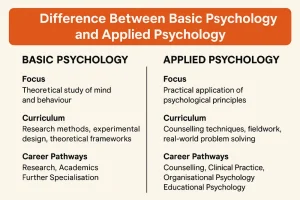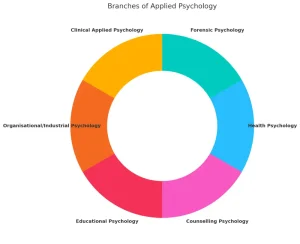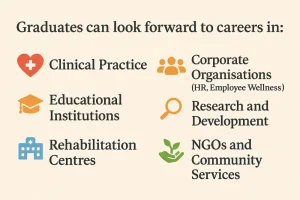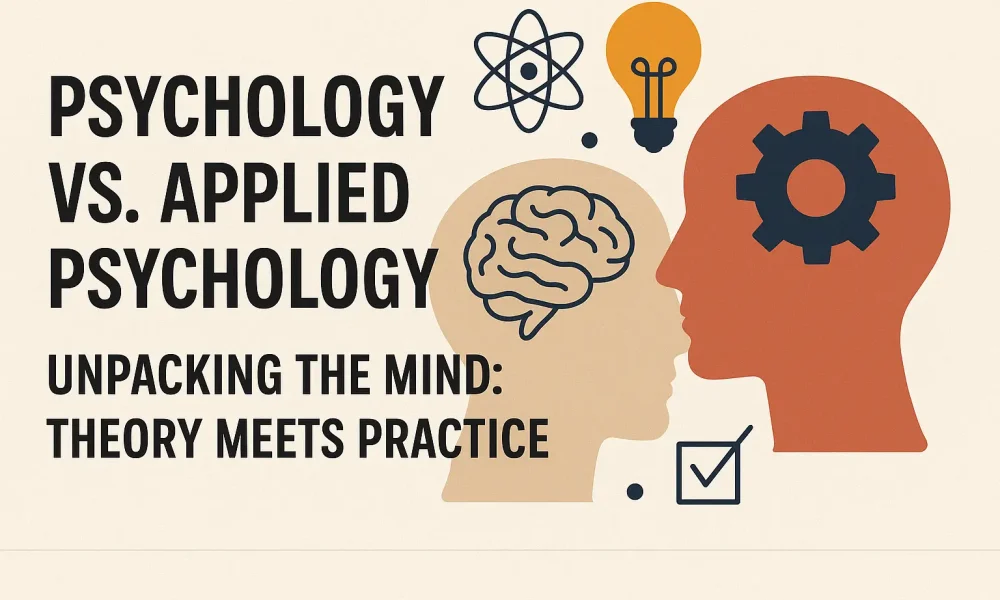Psychology education has witnessed remarkable growth in recent years, reflecting the increasing awareness of mental health and the need for trained professionals in this field. For students aspiring to pursue a career in psychology, it is essential to understand the difference between Psychology and Applied Psychology, as this distinction plays a crucial role in shaping their academic and professional journey. Among the many institutions offering high-quality education in this domain, O. P. Global University stands out for its commitment to providing a wholesome, interdisciplinary, and globally relevant education.
What is Psychology?
Psychology is the scientific study of the human mind, behaviour, and mental processes. It explores how individuals think, feel, and behave across different situations and stages of life. In India, Psychology is taught at undergraduate, postgraduate, and doctoral levels in various universities and colleges.
A Psychology degree focuses on building an in-depth understanding of psychological theories, research methodologies, and human behaviour. Students study core areas such as Cognitive Psychology, Biological Psychology, Developmental Psychology, Social Psychology, and Research Methods. Students get the expertise to enable them to explore human behaviour through scientific inquiry.
As per the guidelines of the University Grants Commission (UGC), Psychology courses in India are designed to foster a strong research orientation. Graduates are often encouraged to pursue further studies or specialise in areas such as Clinical Psychology, Counselling, or Academics.

What is Applied Psychology?
Applied Psychology, on the other hand, is concerned with the practical application of psychological theories and techniques to solve real-life problems. It involves using psychological knowledge to improve individual well-being, enhance organisational effectiveness, and address social and behavioural issues in various settings.
In India, Applied Psychology is offered at undergraduate and postgraduate levels in both public and private institutions. The curriculum focuses on developing practical skills, including counselling techniques, psychological assessment, intervention strategies, and organisational behaviour. Fieldwork, internships, and hands-on training are integral components of Applied Psychology courses, preparing students for direct engagement with clients, organisations, and communities.
Applied Psychology covers the gap between theoretical knowledge and practical implementation, making it a profession-oriented field of study.
Key Differences between Psychology and Applied Psychology
Although both Psychology and Applied Psychology belong to the same discipline, their focus and approach differ significantly.
Psychology vs Applied Psychology
| Aspect | Psychology | Applied Psychology |
| Focus | Theoretical study of mind and behaviour | Practical application of psychological principles |
| Curriculum Orientation | Research methods, experimental design, theoretical frameworks | Counselling techniques, fieldwork, real-world problem solving |
| Skills Developed | Analytical thinking, research skills, theoretical understanding | Practical skills, client interaction, intervention strategies |
| Career Pathways | Research, Academics, Further Specialisation | Counselling, Clinical Practice, Organisational Psychology, Educational Psychology |
Psychology programmes are ideal for students who are inclined towards academic research, theory development, and critical analysis of human behaviour. In contrast, Applied Psychology is best suited for those who wish to work directly with people, offering counselling, therapy, or organisational solutions.
Branches and Specialisations in Psychology Courses
Psychology as a field has several branches, including:

- Clinical Psychology
- Cognitive Psychology
- Developmental Psychology
- Social Psychology
Applied Psychology offers specialisations with a more practice-oriented approach, such as:
- Clinical Applied Psychology
- Organisational/Industrial Psychology
- Educational Psychology
- Counselling Psychology
- Health Psychology
- Forensic Psychology
These different types of psychology courses allow students to focus their studies according to their career aspirations.
Choosing the Right Psychology Programme
Selecting between Psychology and Applied Psychology depends on several factors, including your career goals, interests, and preferred learning style.
| Consideration | Psychology | Applied Psychology |
| Learning Approach | Theory-driven | Practice-oriented |
| Career Aspirations | Academics, Research, Further Studies | Direct Practice, Counselling, Professional Roles |
| Skill Preference | Analytical, Critical Thinking | Communication, Counselling, Intervention Skills |
Psychology Courses- Eligibility Criteria at O.P. Jindal Global School
The eligibility criteria for admission to the B.A. (Hons.) and B.Sc. (Hons.) Psychology programmes at Jindal School of Psychology & Counselling require candidates to have completed their 10+2 education or its equivalent from recognised boards such as CBSE, ISC, State Boards, IB, Cambridge, or any other government-approved boards. Applicants must have secured a minimum aggregate of 60% marks in any stream — Humanities, Science, or Commerce. Additionally, the university offers Merit-cum-Means (MCM) Scholarships for eligible students, which provide financial assistance by covering the tuition fee for the first year of study.

To apply for the M.A./M.Sc. Applied Psychology programme at Jindal Institute of Behavioural Sciences, candidates must hold an undergraduate degree with a minimum of 50% marks. Admission is based on performance in the Jindal-PMAT or other accepted tests like GRE, GMAT, or CAT, followed by a personal interaction. Specialisation is chosen during admission.
Future Prospects In The Field of Psychology
Psychology and Applied Psychology both offer promising career opportunities in the growing mental health sector. Government initiatives such as the National Mental Health Programme since 1982 and the District Mental Health Programme to 704 districts nationwide highlight the increasing demand for skilled professionals across the country.
Graduates can look forward to careers in:
- Clinical Practice
- Educational Institutions
- Corporate Organisations (HR, Employee Wellness)
- Rehabilitation Centres
- Research and Development
- NGOs and Community Services
Moreover, emerging trends like digital mental health platforms, preventive mental health strategies, and interdisciplinary research open new avenues for professionals trained in these disciplines.
Conclusion
Psychology and Applied Psychology represent two complementary pathways within the field of mental health and human behaviour. For prospective students, institutions like the Jindal School of Psychology and Counselling (JSPC) and the Jindal Institute of Behavioural Sciences (JIBS) offer comprehensive education that nurtures both academic excellence and professional competence. Ultimately, the choice between Psychology and Applied Psychology should be guided by one’s personal interests, career ambitions, and passion for contributing to human well-being in a diverse and evolving society like India.
FAQs
1. What is the difference between B.A. (Hons.) and B.Sc. (Hons.) in Psychology at JSPC?
Both degrees cover core psychological concepts, theory, and practice. However, B.Sc. (Hons.) focuses more on research methods, scientific approaches, and data analysis, while B.A. (Hons.) places more emphasis on humanities, counselling, and social aspects of psychology.
2. What entrance exams are required for admission?
For undergraduate programmes (B.A./B.Sc.), applicants must take the JSAT (Jindal Scholastic Aptitude Test) or provide equivalent scores from SAT/ACT/LNAT-UK. For postgraduate programmes (M.A./M.Sc. Applied Psychology), candidates need to take the Jindal-PMAT (Psychology Masters Admissions Test) or may submit GRE scores.
3. Are there scholarship opportunities available?
Yes, O.P. Jindal Global University offers over 2,000 scholarships for the academic year 2024-25, awarded on a merit-cum-means basis. The scholarships cover a significant portion of tuition fees and aim to support deserving students.
4. What are the career prospects after completing these psychology programmes?
Graduates can pursue careers in clinical and counselling psychology, social work, education, human resources, research, healthcare, forensic psychology, community mental health, and organisational consultancy, among others.
5. Can students choose specialisations in the M.A./M.Sc. Applied Psychology programme?
Yes, students can specialise in one of the following areas during their postgraduate studies:
- Child Psychology
- Community Psychology
- Forensic & Investigative Psychology
- Industrial & Organisational Psychology





